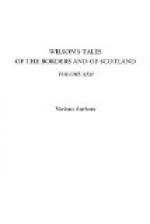THE DIAMOND EYES.
When I entered Edinburgh College the students were tolerably free from any of those clubs or parties into which some factitious subject—often a whim—divides them. In the prior year the spirit of wager had seized a great number of them with the harpy talons of the demon of gambling, giving rise to consequences prejudicial to their morals, as well as to their studies. A great deal of money among the richer of them changed hands upon the result of bets, often the most frivolous, if not altogether ridiculous. Now, we are not to say that, abstracted from the love of money, the act of betting is unqualifiedly bad, if rather we may not be able to say something for it, insomuch as it sometimes brings out, and stamps ingenuity or sagacity, while it represses and chastises arrogance. But the practice at the College at that time was actually wild. They sought out subjects; the aye and the no of ordinary converse was followed by the gauntlet, which was taken up on the instant; and they even had an umpire in the club, a respectable young man of the name of Hawley, who was too wise to bet himself, but who was pleased with the honour of being privileged to decide the bets of the others.
In the heat of this wild enthusiasm, it happened that two of these youths, one called Henry Dewhurst, and the other Frank Hamilton, were walking on the jetty which runs out from the harbour of Leith a full mile into the Forth. Dewhurst was the son of a West India planter, who allowed him L300 a year, every penny of which was spent in paying only a part of his bills long before the year was done; one of which bills I had an opportunity of seeing, to my wonder—how any one could eat L15 worth of tarts and sweetmeats in the course of not many months! Hamilton was the son of a west country proprietor, and enjoyed the privilege of using, to his ruin, a yearly allowance of L250. In the midst of their sauntering they hailed two of their friends,—one Campbell, a sworn companion of the young West Indian; and the other Cameron, as closely allied to Hamilton;—all the four being, as the saying goes, “birds of a feather,” tossing their wings in the gale of sprees, and not always sleeping in their own nests at night.
As they approached the end of the jetty, they met a lad who had wounded one of these large gulls called Tom Norries,—a beautiful creature, with its fine lead-coloured wings and charming snow-white breast, and eye like a diamond.
“I will give you a shilling for the bird,” said Dewhurst.
“But what are you to do with it?” replied the lad. “I would not like it to be killed. It is only hurt in the wing; and I will get half-a-crown for it from one who has a garden to keep it in.”
“No, no,” said Dewhurst, “I’ll not kill it. Here’s your half-crown.”




